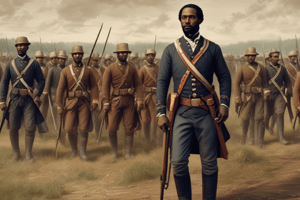Podcast
Questions and Answers
What was the primary dispute that led to the American Civil War?
What was the primary dispute that led to the American Civil War?
- Expansion of slavery into western territories (correct)
- Foreign policy and international relations
- States' rights versus federal authority
- Economic disagreements between the North and South
Who was the president of the Confederacy during the American Civil War?
Who was the president of the Confederacy during the American Civil War?
- Ulysses S. Grant
- Robert E. Lee
- Jefferson Davis (correct)
- Abraham Lincoln
What was the significance of the Emancipation Proclamation issued by Abraham Lincoln on January 1, 1863?
What was the significance of the Emancipation Proclamation issued by Abraham Lincoln on January 1, 1863?
- It declared all slaves in rebel states to be free (correct)
- It granted citizenship to all freed slaves
- It declared the entire United States to be a slave-free nation
- It allowed slavery to continue in border states
What was the result of the Union's military efforts in the Western Theater during 1861-1862?
What was the result of the Union's military efforts in the Western Theater during 1861-1862?
What was the outcome of the Confederacy's river navy by the summer of 1862?
What was the outcome of the Confederacy's river navy by the summer of 1862?
What was the approximate number of enslaved people in the country when the Emancipation Proclamation was issued?
What was the approximate number of enslaved people in the country when the Emancipation Proclamation was issued?
How many southern states seceded from the United States after the war began?
How many southern states seceded from the United States after the war began?
What was the approximate percentage of the U.S. population that the Confederacy controlled at its peak?
What was the approximate percentage of the U.S. population that the Confederacy controlled at its peak?
What was the significant outcome of the Union's successful siege of Vicksburg in 1863?
What was the significant outcome of the Union's successful siege of Vicksburg in 1863?
Who led the Union army to victory in the Battle of Gettysburg?
Who led the Union army to victory in the Battle of Gettysburg?
What was the result of the Union's naval blockade of Confederate ports?
What was the result of the Union's naval blockade of Confederate ports?
Who led the march to the sea, resulting in the fall of Atlanta in 1864?
Who led the march to the sea, resulting in the fall of Atlanta in 1864?
What was the symbolic end of the American Civil War?
What was the symbolic end of the American Civil War?
What was the final military department of the Confederacy to disband?
What was the final military department of the Confederacy to disband?
What was one of the significant outcomes of the American Civil War?
What was one of the significant outcomes of the American Civil War?
What was a characteristic of the American Civil War?
What was a characteristic of the American Civil War?
Flashcards are hidden until you start studying
Study Notes
American Civil War
- The American Civil War was fought between the Union (the North) and the Confederacy (the South) from April 12, 1861, to May 26, 1865.
- The war was sparked by a dispute over whether slavery should be allowed to expand into the nation's western territories.
Causes of the War
- Decades of political controversy over slavery led to the war.
- Abraham Lincoln's victory in the 1860 presidential election opposed the expansion of slavery.
Secession and the Start of the War
- Seven southern slave states seceded from the United States and formed the Confederacy after Lincoln's victory.
- The Confederacy seized U.S. forts and federal assets within their borders.
- The war began on April 12, 1861, when the Confederacy bombarded Fort Sumter in South Carolina.
The War
- Four more southern states seceded after the war began.
- The Union made significant gains in the Western Theater in 1861-1862.
- The abolition of slavery became a Union war goal on January 1, 1863, when Lincoln issued the Emancipation Proclamation.
- Over 3.5 million slaves in rebel states were declared free by the Emancipation Proclamation.
- The Union destroyed the Confederacy's river navy by the summer of 1862.
- The successful 1863 Union siege of Vicksburg split the Confederacy in two at the Mississippi River.
- Confederate General Robert E. Lee's incursion north failed at the Battle of Gettysburg.
Turning Points and Surrender
- General Ulysses S. Grant's command of all Union armies in 1864 led to the fall of Atlanta and the March to the Sea.
- The last significant battles raged around the ten-month Siege of Petersburg.
- The Confederates abandoned Richmond, and on April 9, 1865, Lee surrendered to Grant following the Battle of Appomattox Court House.
- Lee's surrender set off a wave of Confederate surrenders, with the last military department of the Confederacy disbanding on May 26, 1865.
Aftermath
- Much of the South's infrastructure was destroyed by the end of the war.
- The Confederacy collapsed, slavery was abolished, and four million enslaved black people were freed.
- The war-torn nation entered the Reconstruction era to rebuild the country and grant civil rights to freed slaves.
Significance
- The American Civil War was one of the first wars to use industrial warfare.
- The war is one of the most extensively studied and written about episodes in U.S. history.
Studying That Suits You
Use AI to generate personalized quizzes and flashcards to suit your learning preferences.



